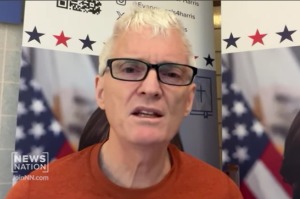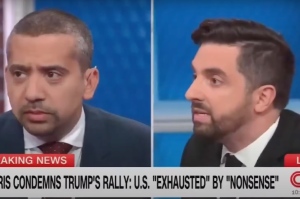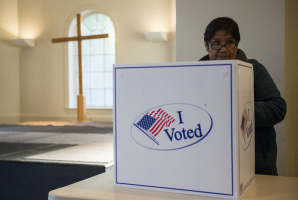Luis Palau Says Chinese Churches Should Register Themselves
At a Nov. 19 press conference in Beijing, Luis Palau, founder of Luis Palau Evangelistic Association, said he wants to dispel misunderstandings about the Chinese government. He urged Chinese Christians to register their churches and worship openly.
BEIJING – Luis Palau, founder of Luis Palau Association, says there is more freedom in China than people have anticipated. He said that churches are not underground, just unregistered.
“What excites me is that more Chinese people are coming to faith. And I want to make every effort to let people know that there is more freedom in China than people have anticipated," said Palau at a Nov. 19 press conference in Beijing.
“First of all, I would not call them ‘underground’ churches, but ‘unregistered.' ‘Underground’ has the connotation that you are hiding, and that is not how it is," he said. “Personally, I would encourage the unregistered churches to register and receive greater freedom and blessings from the government."
He said the government’s urging of house churches to register is similar to the way churches must register in the U.S. and in his native country, Argentina.
“For example, in the U.S. you have to register to pay taxes and get your tax returns,” he said. “For clergy, only when they register would they receive the benefits from the government as clergymen. The U.S. did this for the sake of keeping order. In Argentina, our churches registered with the government.”
And if there are laws that do stand on biblical truth, Christians should be able to stand for their faith. However, faith should not be used as a pretense to defy the law, he said.
“Even in the United States you can’t get away with defying order,” he said.
“I feel that registering is a positive thing for the followers of Jesus,” he added. “Believers should live in the open, especially when the Chinese government offers it. Jesus said that we are the light of the world, and that we should not be kept hidden or in the dark. Therefore, believers should share their faith openly.”
“If I were Chinese, I would definitely register. Not registering only lends to misinterpretations and misunderstandings,” he added.
On several accounts, he said some reports of persecution in China were unjustified. He once consulted some Chinese church pastors about a report that pastors were arrested in Beijing. The arrest turned out to be false and the report was later retracted.
One young pastor actually became angry and asked why Westerners are always asking about persecution in China. What they need are Bibles and Christian literature, the young pastor said.
“When I heard the angry response, I was very pleased actually," said Palau. "It allows me to know more of the thoughts of Chinese Christians and what they truly need from us.”
The reasons for the misconceptions, said Palau, hark back to the Cultural Revolution. But China has changed much since then.
Palau said the Chinese government gave him “total freedom to express myself in my preaching” during the week's trip, Nov. 15-21.
“In the past, pastors have been restricted and arrested. Today, you don’t get arrested unless you break the law,” he said.
News of persecution happen at local levels, miles away from Beijing, and the facts of the stories are often unknown.
“It could just be local authorities acting on their own accord,” he said.
Palau feels that people are able to worship openly in China. He saw a bookstore openly selling Christian literature, which shocked him. Palau also mentioned China’s push for seminaries and the building of churches in Beijing and Shanghai.
“There are now young people in China that have doctoral degrees in theology. Young people were sent to seminaries to study,” he said. “And even recently the government has considered publishing theological books openly.”
Nanjing is building a new Protestant theological seminary to be completed by 2007. Two new churches are being built in Beijing, and the government has decided to refurbish an Anglican cathedral in Shanghai.
“I want to encourage Americans and Europeans to visit China often and diffuse their misconceptions,” he said.
Dr. Tim Robnett, the director of International Festivals for the Luis Palau Association, explains that Palau’s role on this trip is to promote greater religious freedom through diplomatic means.
“Luis is trying to help all sides of the issue. I mean, how can you use pressure to promote change?" asked Robnett. "Luis is a person who is not afraid when it comes to talking about the issues, but ultimately it is about how we can engage and promote greater religious freedom and what we can do to change the situation."
Palau is one of the most respected evangelists in the Spanish-speaking world today. His faith-based ministry has taken the message of hope to an estimated 20 million people in 70 nations. He is well known for the festivals he has held over the years. Recent festivals included Washington D.C.; Madrid, Spain; and Mendoza, Argentina.
This week marks Palau’s fifth trip to China. Palau visited Beijing at the invitation of the Chinese Minister of Civil Affairs to speak at a charity conference hosted by government officials titled, “Hand in Hand in Charity; Shoulder to Shoulder to Harmony.” The conference featured charity organizations throughout China and discussed how to solve poverty in the nation.
The weeklong trip allotted Palau time to meet with former Information Minister, Zhao Qizheng, whom he said he had “instant affection” for when the two met in May 2005. On this visit, they co-signed a book project, “A Friendly Dialogue Between a Christian and an Atheist.” The project has received extensive press coverage throughout China.
While in Beijing, Palau attended a Sunday service at Gangwashi Church as part of President George W. Bush’s entourage. Later that day, Palau preached at the church to a crowd of over 500 in the sanctuary and hundreds more in hallways and outside in the open air watching the proceedings on television sets.
Since 2000, the ministry has worked to Palau’s goal to hold open-air evangelistic festivals in both Shanghai and Beijing.
[Editor’s Note: Anthony Chiu reported from Beijing for this article and Rhoda Tse from New York.]




























